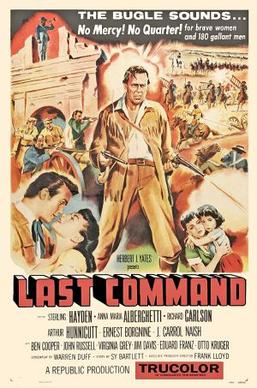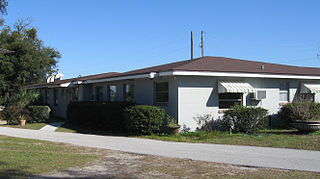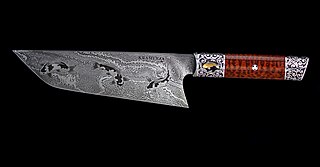Related Research Articles

Washington is a city in Ozan Township, Hempstead County, Arkansas, United States. The population was 180 at the 2010 census, up from 148 in 2000. It is part of the Hope Micropolitan Statistical Area. The city is home to Historic Washington State Park.

James Bowie was a 19th-century American pioneer, slave smuggler and trader, and soldier who played a prominent role in the Texas Revolution. He was among the Americans who died at the Battle of the Alamo. Stories of him as a fighter and frontiersman, both real and fictitious, have made him a legendary figure in Texas history and a folk hero of American culture.

The 39th Infantry Brigade Combat Team, also officially known as The Arkansas Brigade, is an infantry brigade combat team of the Army National Guard composed of personnel from the U.S. states of Arkansas, Missouri, and Nebraska. The unit is the largest Army National Guard command in Arkansas and is headquartered at the Camp Robinson Maneuver Training Center. It was ordered into federal service in 2003 in support of Operation Iraqi Freedom II. The 39th was attached to the 1st Cavalry Division and served in and around Baghdad for a year, returning to the United States in March 2005.

A Bowie knife is a pattern of fixed-blade fighting knife created by Rezin Bowie in the early 19th century for his brother Jim Bowie, who had become famous for his use of a large knife at a duel known as the Sandbar Fight.

In modern terminology, the Arkansas toothpick is a heavy dagger with a 12-to-20-inch pointed, straight blade. The knife can be used for thrusting and slashing. James Black, known for improving the Bowie knife, is credited with inventing the Arkansas toothpick.

The Alamo: 13 Days to Glory is a 1987 American Western television miniseries later edited into a feature film about the 1836 Battle of the Alamo written and directed by Burt Kennedy, starring James Arness as James Bowie, Brian Keith as Davy Crockett, Alec Baldwin as William Barrett Travis, Raul Julia as Antonio López de Santa Anna, and featuring a single scene cameo by Lorne Greene as Sam Houston. Unlike most other films about the Alamo — the most prominent other exception being the 1955 film The Last Command — it focuses on Bowie as the main character rather than Crockett.
The Sandbar Fight, also known as the Vidalia Sandbar Fight, was a formal one-on-one duel that erupted into a violent brawl involving a number of combatants on September 19, 1827. It took place on a large sandbar in the Mississippi River, a few miles north of Vidalia, Louisiana and Natchez, Mississippi. The fight resulted in the death of General Samuel Cuny and Major Norris Wright. American pioneer and folk hero James Bowie survived but was seriously injured in the fight.

Rezin Pleasant Bowie was a planter, inventor, and mercenary. He also served three terms in the Louisiana House of Representatives.

Bladesmithing is the art of making knives, swords, daggers and other blades using a forge, hammer, anvil, and other smithing tools. Bladesmiths employ a variety of metalworking techniques similar to those used by blacksmiths, as well as woodworking for knife and sword handles, and often leatherworking for sheaths. Bladesmithing is an art that is thousands of years old and found in cultures as diverse as China, Japan, India, Germany, Korea, the Middle East, Spain and the British Isles. As with any art shrouded in history, there are myths and misconceptions about the process. While traditionally bladesmithing referred to the manufacture of any blade by any means, the majority of contemporary craftsmen referred to as bladesmiths are those who primarily manufacture blades by means of using a forge to shape the blade as opposed to knifemakers who form blades by use of the stock removal method, although there is some overlap between both crafts.
Blade is a consumer magazine about knife collecting. The magazine is based in Appleton, Wisconsin.

The Last Command is a 1955 American Western film directed by Frank Lloyd starring Sterling Hayden, Anna Maria Alberghetti, Richard Carlson, Arthur Hunnicutt, Ernest Borgnine and J. Carrol Naish based on the life of Jim Bowie and the Battle of the Alamo.
The Adventures of Jim Bowie is an American Western television series that aired on ABC from 1956 to 1958. Its setting was the 1830s-era Louisiana Territory. The series was an adaptation of the book Tempered Blade, by Monte Barrett.

Randall Made Knives, usually referred to as Randall, is an American custom handcrafted knife manufacturer founded by Walter Doane "Bo" Randall, Jr. in the U.S. The knife making shop and showroom is located in Orlando, Florida. Randall began making knives as a hobby in 1937. His son and grandson continue the family trade along with 20 craftsmen producing about 8,000 knives per year out of a shop on South Orange Blossom Trail.
The First Texan is a 1956 American Technicolor western film directed by Byron Haskin and starring Joel McCrea, Felicia Farr and Jeff Morrow. Produced by Walter Mirisch, it was shot in CinemaScope and distributed by Allied Artists. It is set during the Texas Revolution of the 1830s.
The American Bladesmith Society, or ABS, is a non-profit organization composed of knifemakers whose primary function is to promote the techniques of forging steel blades. The ABS was founded by knifemaker William F. Moran, who came up with the concept in 1972 when he was Chairman of the Knifemakers' Guild; the following year, he introduced Damascus steel blades at an annual show. In 1976, he incorporated the organization, and it received non-profit status in 1985.
James Buel Lile, known as Jimmy Lile and "The Arkansas Knifesmith", was an American knifemaker from Russellville in Pope County, Arkansas, who made the Rambo Knife for the films First Blood and Rambo: First Blood Part II. As a knifemaker Lile served as a president of the Knifemakers' Guild and on the board of directors of the American Bladesmith Society.
William Francis Moran Jr., also known as Bill Moran, was a pioneering American knifemaker who founded the American Bladesmith Society and reintroduced the process of making pattern welded steel to modern knife making. Moran's knives were sought after by celebrities and heads-of-state. The "William F. Moran School of Bladesmithing" bears his name and in addition to founding the ABS, he was a Blade Magazine Hall of Fame Member and a President of the Knifemakers' Guild.
Jerry Fisk is an American bladesmith based in Nashville, Arkansas. Fisk was named a National Living Treasure in 1998 by the University of North Carolina at Wilmington’s Museum of World Cultures.

The Iron Mistress is a 1952 American Western film directed by Gordon Douglas and starring Alan Ladd and Virginia Mayo. It ends with Bowie's marriage to Ursula de Veramendi and does not deal with his death at the Battle of the Alamo in 1836.

Bob Kramer is an American bladesmith, "widely considered the greatest American knifesmith working today". Some consider his kitchen knives to be "the best in the world". His first knife shop in Seattle, Bladesmiths, opened in 1993. As of 2017 he forges steel and makes knives in Bellingham, Washington.
References
- 1 2 3 4 5 6 Pacella, Gerard (2002). 100 Legendary Knives. Krause Publications. p. 18. ISBN 978-0873494175.
- 1 2 Davis, William C. (1998). Three Roads to the Alamo: The Lives and Fortunes of David Crockett, James Bowie, and William Barret Travis. New York: HarperCollins. p. 677. ISBN 0-06-017334-3.
- ↑ Flayderman, Norm (2004). The Bowie knife : unsheathing an American legend. Lincoln, R.I: Andrew Mowbray. p. 445,447. ISBN 9781931464123.
- ↑ Worthen, Bill. "Revisiting the James Black Question..." (PDF). Archived from the original (PDF) on 2013-07-30. Retrieved February 2, 2015.
- ↑ Shackleford, Steve (1997). "Family Rules at ABS Hall of Fame". Blade. F&W Media. 24 (12): 66.
- ↑ The Adventures of Jim Bowie, Classic TV & Movie Hits, retrieved 2007-10-12
- ↑ Adventures of Jim Bowie, FiftiesWeb.com, archived from the original on 2007-10-14, retrieved 2007-10-12